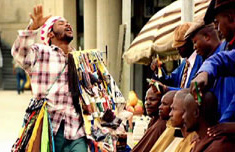2010 'fair deal' for small business
Lavinia Mahlangu
19 July 2006Although Fifa has big business as its official sponsors for the 2010 World Cup, small businesses in South Africa will receive a "fair deal" from the tournament, says Trade and Industry Deputy Minister Elizabeth Thabethe.
"There have been a lot of discussions around how small business can benefit from 2010, particularly because Fifa has a lot of rules [regarding official sponsorships]," Thabethe told journalists in Pretoria on Tuesday.
"There have been discussions stressing the question of ensuring that small, medium and micro enterprises (SMMEs) get a fair deal."
Small business summit
Thabethe was speaking at the media launch of the first tri-nations summit on small business, to held in Durban from 23 to 26 August.
The summit is being hosted by South Africa's Small Enterprise Development Agency (Seda) and is being attended by its counterparts from Brazil (Sebrae) and India (NSIC).
This forms a part of the India, Brazil and South Africa (IBSA) Dialogue Forum, established in 2004 with the aim of deepening South-South cooperation and promoting increased trade and investment between South Africa, India and Brazil.
The third session of the IBSA ministerial commission took place in Rio de Janeiro in March.
2010 opportunities
Thabethe said that according to Local Organising Committee CEO Danny Jordaan, SMMEs would have ample opportunities to conduct their business at venues outside stadiums.
With venues such as pubs with giant screen televisions showing matches and similar gatherings of football fans, there would be plenty of scope for small business owners to benefit from the soccer spectacular.
"In terms of 2010, as part of the summit there will be an opportunity for small business to form linkages," Seda CEO Wawa Damane told journalists
She said that Seda's partnerships with Brazil's Sebrae and India's NSIC would be exploited to their full potential. "Working together with these agencies, we will enrich on our programmes," Damane said.
Brazilian, Indian experiences
Damane said Sebrae had about 600 service points in Brazil and had been operating for about 30 years, explaining that Seda hoped to adopt this business model in ensuring "extensive" reach for its beneficiaries.
Aron Kumarja, director of the NSIC, said his organisation had been operating for 50 years, with a particular focus on linking the first and second economies in that country.
Seda hoped to gain expertise from the NSIC, particularly in the sphere of tailoring technology for small business.
Seda, which is fully state funded, hopes eventually to become self-sufficient. Both the NSIC and Sebrae are now funded by their members and donors.
Source: BuaNews













